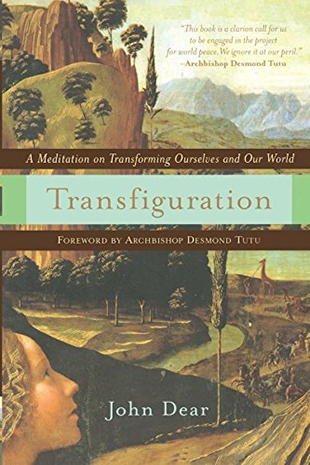At one time or another in our lives, many of us have had a mountaintop experience when we were swept off our feet and set on a new course. It may have happened during a spiritual pilgrimage, a weekend retreat, or an encounter with an extraordinary individual or group of people. Whenever and wherever, we were transformed, and if it hasn't happened to us yet, we want a piece of that action. According to the Gospels ((Matthew 17: 1-8), Jesus had this kind of astonishing experience at Mount Tabor where he was transfigured before his disciples and God spoke to him. This empowering experience came at a critical moment in his ministry when he was challenged to take up his mission to seek justice, make peace, and lay down his life for humanity. His self-understanding was confirmed by Moses and Elijah who affirmed his vocation as the nonviolent Messiah.
John Dear is a Jesuit priest, author, lecturer, retreat leader, and one of our Living Spiritual Teachers. An internationally recognized voice for peace, he has served as the director of the Fellowship of Reconciliation, an interfaith peace organization; a Red Cross coordinator of chaplains in New York City after the September 11, 2001, attacks; and the pastor of several churches. He lives in the desert of northeastern New Mexico and writes a weekly column for the National Catholic Reporter.
Dear begins with a question that he posed to the Jesuit poet and antiwar activist Daniel Berrigan years ago about the kind of life he should lead: "What is the point of all this?" Berrigan's response: "All we have to do is make our lives fit into the story of Jesus. We have to get our lives to make sense in the light of the Gospel." That is exactly what Dear does in this exploration of the Transfiguration.
This accessible and well-realized book is divided into five sections: walking in the footsteps of Jesus; going up the mountain with Jesus; recognizing the transfigured Jesus in our midst; going down the mountain to the cross; and fulfilling our mission of transfiguration nonviolence in a culture of violence and war. Each section begins with a few questions and concludes with probes for personal reflection and prayer. Dear adds commentaries on Jesus at prayer, the light motif, the sleeping and fearfulness of his followers, and the marks of true discipleship. Throughout the book, the author salutes the commitment and ardor of Christian saints and sages who have given their all in radical service to Jesus — Mother Teresa, Dorothy Day, Martin Luther King, Jr., Archbishop Oscar Romero, Phillip Berrigan, Thomas Merton, and others. Dear covers his own discipleship journey — speaking out against war and nuclear weapons, advocating for disarmament and justice.
Dear insists that going to the mountaintop with Jesus means coming down to earth and practicing the path of nonviolence. This is not an abstraction; there are places today where Jesus' way must be applied: "As we too announce God's reign of peace and justice, and make clear the political consequences of this spiritual revolution — that the war on Iraq must end, that we can no longer fund the Israeli occupation of Palestine, that we have to feed all starving people from Darfur to Delhi, and that we have to dismantle our nuclear arsenal from Los Alamos to Livermore Labors — we too will face rejection, harassment, and persecution."
Dear laments the fact that large numbers of Christians do not see the necessity of loving their enemies as Jesus instructed them in the Sermon on the Mount. He quotes Gandhi: "Jesus was the most active nonviolent resister known to history. But the only people who do not know that Jesus is nonviolent are Christians." Dear urges us to follow Gandhi, St. Ignatius, and Francis of Assisi by laying down our swords and embarking on a journey of nonviolence. We must listen to where Jesus is speaking today and see the risen life as one of fearless love, hope, and peace.
In a totally convincing chapter, Dear contrasts the August 6th celebration of the Transfiguration with what he calls "the demonic U. S. bombing of Hiroshima." One is about Jesus' way of contemplative nonviolence and the other holds up the anti-Transfiguration culture of violence, injustice, and war. Dear ends on a high and holy note as he lifts up the work of the Truth and Reconciliation Commission in South Africa as an inspiring example of a Transfiguration moment. This thought-provoking and soul-stirring book encourages us to become more active and fearless peacemakers in a time of great danger and confusion.
